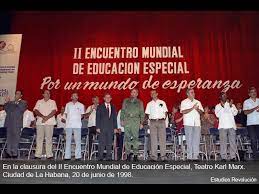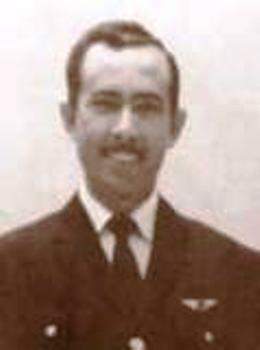
Havana ephemeris. June 20th.
1998. Commander in Chief Fidel Castro speaks at the “Karl Marx” theater in Havana, at the closing of the Second World Meeting on Special Education.

He made reference to the critical situation that existed in the sphere of education in Cuba when the Revolution triumphed in January 1959.
He pointed out the efforts made since that first stage of the revolutionary process to eradicate illiteracy, urgently train teachers, build schools and later also create specific centers to care for children and youth with disabilities.
Fidel also highlighted: “I think that special education, one of the fundamental issues that you have analyzed in these days, is extraordinarily human; I think that no state, no government with a little resources should fail to fulfill this elementary duty.”
He commented on what had been discussed at that international event related to special education.
He detailed: “There is no dogma, let's always look for the best and learn to find the best, perfect what we are doing as researchers check and advance. Because if there is something I really liked, it is being able to check in the materials and in the words that were pronounced here how work has been done in pedagogical research and how new concepts have been arrived at, and it was not from one day to the next.”
And regarding Cuba, Fidel assured: “The Revolution has not only done a work in the material, it has done a work in the conscience, in the soul of the people, preparing the human being, who must be the human being of tomorrow, of the future, and fighting against lies, fighting against the dirtiest and grossest propaganda, fighting against blockades, and fighting against harassment to try to weaken the Revolution, to try to weaken its morale, its conscience.”
In addition, he highlighted in his speech: “Honor and glory to all those who work with infinite dedication and nobility in special education, so necessary and so extraordinarily human!
Honor and glory to the teachers who have participated in this meeting from twenty-four countries!
Honor and glory to the heroic Cuban teachers!”
1926. Fernando Álvarez Pérez is born in Havana.

From the stage of his youth he had a great fondness for aviation. The son of a humble family, he set aside part of his low salary to pay for classes at the El Halcón aviation school in Santa Fe. Little by little, he accumulated the 30 hours necessary to obtain the license, with which he could fly airplanes. little ones. Once this was achieved, he began to work as an instructor in a school in El Chico, in Wajay, at the same time that he was adding the 200 hours that would allow him to obtain a license to fly in any line. Already in 1954 he had started working on the Inter-American Air Express. He later resided for a time in the United States. He returned to Cuba when the victory of the Revolution took place. He then continued working on the Expreso Aéreo until 1960, when this line was integrated into Cubana de Aviación. At the same time, he provided special services to the Revolutionary Air Force, on patrol missions during the Bay of Pigs invasion and the October Crisis.
In 1966, with his heroic attitude against the action of the flight engineer who even killed the plane's escort and threatened him while urging him to steer the plane towards North American territory, Fernando Álvarez made true what he had said about him not he would never accept that a plane he piloted was hijacked.
His murder occurred on March 27, 1966.